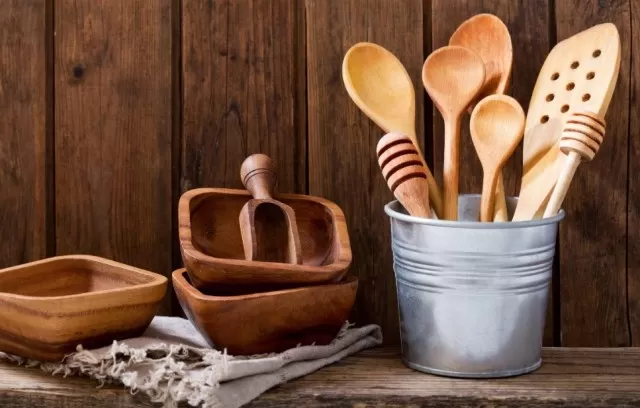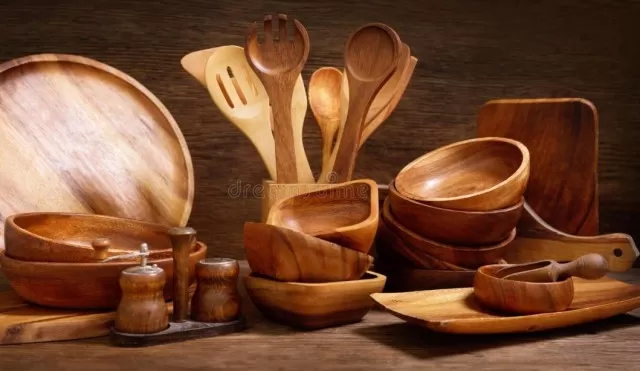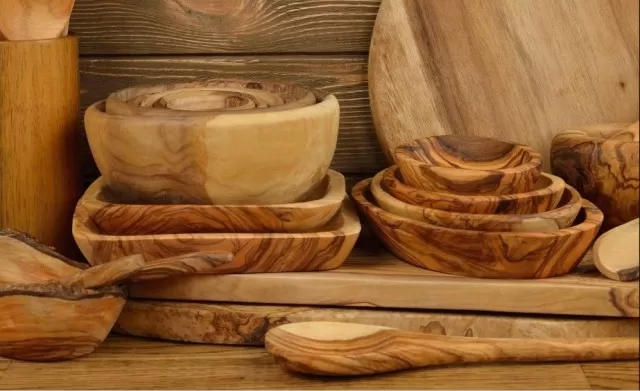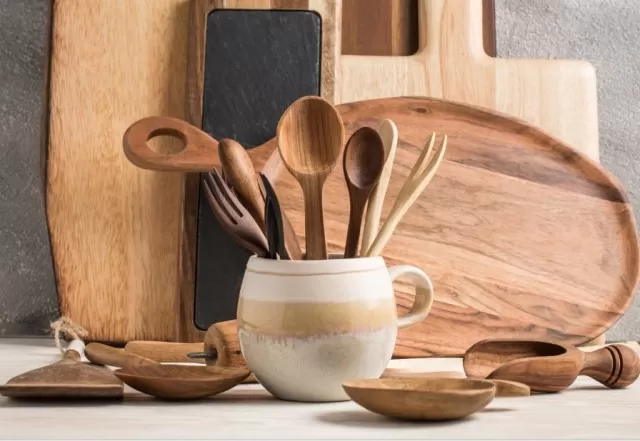Properly cleaning wooden spoons and other cooking tools/utensils is essential to maintain their longevity and hygiene.
Cleaning wooden spoons and other cooking utensils

Properly cleaning wooden spoons and other cooking tools/utensils is essential to maintain their longevity and hygiene.
Although wood has natural antibacterial properties, it is sensitive to harsh chemicals, moisture, and extreme dry heat. To ensure the best care for your wooden utensils, follow these simple steps for washing, sanitizing, and drying.
Hand-washing:
Wooden utensils should always be hand-washed and never put in the dishwasher.
Submerge the utensils in warm water with mild Dish Soap.
Gently scrub:
Use a soft sponge or cloth to gently scrub the wooden utensils, removing any food residue or stains.
Avoid using abrasive scrubbers that may damage the wood.
Rinse thoroughly:
Rinse the utensils under warm running water to remove any soap residue.
Sanitizing:
To sanitize wooden utensils, you can use a diluted solution of White Vinegar and water.
Mix equal parts vinegar and water in a bowl or sink, and let the utensils soak for a few minutes. Then, rinse them with water and pat them dry.
Drying:
After washing, it’s crucial to thoroughly dry wooden utensils to prevent moisture from seeping into the wood.
Use a clean towel to dry them immediately after washing. Ensure all the utensils are completely dry before storing them.
Oil treatment:
Periodically, it’s beneficial to treat wooden utensils with food-safe oil, such as mineral oil or coconut oil.
Apply a small amount of oil to a clean cloth and rub it into the wood. This helps to keep the wood moisturized and prevents it from drying out or cracking.
Remember, wooden utensils should never be soaked in water or left to air dry, as prolonged exposure to water can cause warping or splitting.
By following these steps, you can properly clean and maintain your wooden spoons and utensils, ensuring their durability and functionality in the kitchen.
Before Cleaning & When to Replace Wooden Spoons and Cooking Utensils

Before Cleaning Wooden Spoons and Cooking Utensils
Before you begin cleaning wooden spoons and utensils, it’s important to be aware of some common mistakes to avoid.
Taking these precautions will help prolong the lifespan of these timeless kitchen tools. Here are some points to keep in mind:
Avoid using the dishwasher:
Dishwashers can be detrimental to wooden utensils.
The pressurized water and heat in the dishwasher can damage the wood and cause warping. Hand-washing is the preferred method.
Don’t submerge or soak wooden utensils for long periods:
Prolonged exposure to water can result in waterlogging, warping, or cracking of the wood.
Keep the contact with water to a minimum and avoid soaking the utensils.
Use mild dish soap:
Strong and abrasive chemical soaps can break down the wood.
Stick to simple and gentle household dish soap when cleaning wooden utensils.
When to Replace Wooden Spoons and Cooking Utensils
Knowing when to replace wooden spoons and cooking utensils is also crucial.
While they are durable, there comes a point when replacing them is necessary. Consider the following guidelines:
Replace every five years:
Even if wooden utensils may still appear functional, it is recommended to replace them every five years to ensure hygiene and safety in the kitchen.
Discard damaged or discolored utensils:
If you notice any signs of cracking, warping, or discoloration with mold or other growth, it is important to dispose of them immediately.
Replace them with new utensils to maintain cleanliness and prevent potential health risks.
By avoiding common mistakes and knowing when to replace wooden spoons and utensils, you can ensure their longevity and maintain a safe and hygienic kitchen environment.
Dealing with tough food residue on wooden utensils

When dealing with tough food residue on wooden utensils, there are additional cleaning tricks you can try to give them a deeper clean.
Here are some methods you can use:
baking soda:
Create a paste by combining 1 tablespoon of baking soda with 1 teaspoon of water.
Apply the paste to the wooden spoon or utensil, scrub gently, and then rinse it off thoroughly. Dry the utensil well before storing it.
Distilled White Vinegar:
Make a solution with equal parts of distilled white vinegar and water.
Wash the wooden utensil with this solution to tackle stubborn buildup. Rinse it thoroughly and ensure it’s completely dry before storing.
Hydrogen Peroxide:
While wooden utensils have natural antibacterial properties, there may be times when a deeper clean is needed.
To sanitize wooden spoons, soak them in hydrogen peroxide for approximately 15 minutes. Then, rinse them thoroughly with water and allow them to air dry.
Oil:
To prevent wooden utensils from drying out or cracking, applying oil is a great strategy.
Food-grade mineral oil, conditioning oil, or beeswax can be used for this purpose. After washing and drying the utensil, use a cloth to apply a small amount of oil or wax.
Allow the oil to sit for about 10 minutes, and then wipe off any excess.
These additional cleaning methods can help remove tough stains, odors, and buildup from wooden utensils.
By using these tricks, you can keep your wooden utensils clean, fresh, and in good condition for longer periods.
Step-by-Step Instructions for cleaning wooden spoons and utensils

Here are the step-by-step instructions for cleaning wooden spoons and utensils by hand:
Rinse the utensil:
After each use, rinse the wooden spoon or utensil under warm water to remove any leftover food particles.
This step is important to prevent odors and stains from setting in. Use gentle warm water, avoiding extremely hot water.
Hand-wash with dish soap:
Apply a small amount of mild dish soap to a cloth, sponge, or non-abrasive brush.
Gently scrub the wooden spoon or utensil in a circular motion, ensuring to clean all areas, including the handle and any crevices.
Rinse thoroughly:
Rinse the wooden spoon or utensil under warm water to remove any soap or food residue.
Ensure that no suds are left behind.
Air-dry the utensil:
It’s crucial to thoroughly air-dry wooden spoons and utensils before storing them.
Use a clean cloth or paper towel to wipe and pat them dry. For better airflow, prop the utensils up in a dish rack instead of laying them flat.
Allow them to dry completely. Avoid storing damp utensils as it can lead to mustiness or cracking.
Store in a cool, ventilated place:
Once the utensils are completely dry, store them in a cool and ventilated area.
This helps to maintain their freshness and prevent any potential moisture buildup.
By following these instructions, you can effectively clean wooden spoons and utensils by hand without causing any damage to the natural material.
*The information is for reference only.